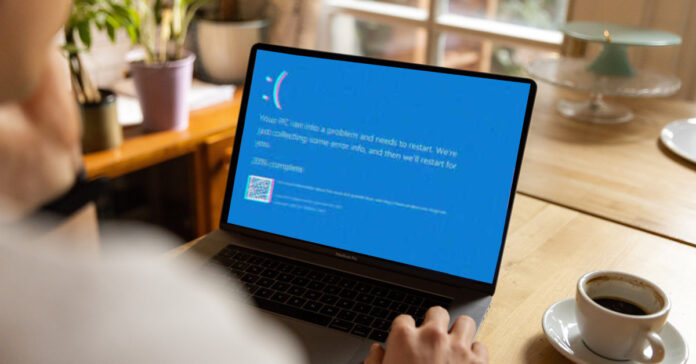
On Friday, millions of Americans and Europeans found out they couldn’t board a plane, buy gasoline, or get cash from their ATM. Fedex and UPS deliveries were disrupted. Credit card networks were down, kiosks and automated systems failed to work, many of the stores that did open could only accept cash, and many businesses closed, sending employees home. Quite a few remote workers found they could not work because their remote systems were nonfunctional. Even hospitals, 911 emergency dispatch systems, and television stations were affected, all because of a computer glitch that caused the dreaded Microsoft “blue screen of death.”
This massive computer glitch, which Elon Musk rightly called the biggest IT failure ever, was courtesy of an update pushed onto systems by CrowdStrike, a company whose sole reason for existing is to stop hacking and virus attacks from… downing computer systems. (Oops!)
The broad failure of computers using Microsoft operating systems was compared to what Y2K would have been like if the Y2K bug hadn’t been fixed. Only, there was a relatively fast fix for this problem, which would not have been the case for the Y2K bug.
To fix your computer, you must know how to boot it in safe mode, where to go, and what file to delete. Easy enough for someone with some familiarity with windows, but perhaps beyond the scope of cashiers, bank tellers, and airline gate personnel. Plus, many large corporations forbid employees from tinkering with their computers and lock down administrative access. As a result, flights are still disrupted as thousands were canceled on Sunday.
Many businesses are lucky this happened on a Friday because it gave them all weekend to recover. It will be interesting to see if banks and ATMs are back up and running on Monday.
What Worked
While many systems were down, this was not a total collapse or system-wide outage that we might see in a massive cyberattack. For example, some ATMs were unaffected. While all those things we listed above suffered outages, plenty of our electronics were unaffected. These include:
- Apple computers, phones, and tablets
- Chromebooks and android systems
- Anything running on Linux and similar operating systems
- The phone system, including most cell phones
- Most television, streaming, cable and broadcast networks
- Industrial and machine applications that were not using Microsoft OS
- Much of the cloud, probably because so many servers run on Unix-like software
- Large parts of ecommerce
- Most local mass transportation
- Utilities
- Computers in Russia, China and other parts of the world where Microsoft is not the dominant OS
In other words, while this latest cyber incident was disruptive, things could have been worse, much worse if our enemies had started a cyber war or tried to bring down the Internet. Imagine, for example, that phones had crashed or utilities had been taken off line. Don’t make the mistake of taking this too lightly. Think of it this way: just because you came through a category one hurricane unscathed doesn’t mean you are prepared for a category five hurricane.
We’re Good
But while Microsoft systems were crashing and headlines screamed about hundreds of canceled flights and millions of failed computers, it didn’t affect us at all. Both my wife and I went about our normal day on Friday. She went shopping, visiting two stores and a car repair shop to get an estimate. I ran a few errands, went to the eye doctor, and picked up books at the library. No computer glitches were encountered then or since, likely because none of the places we dealt with were Fortune 500 or other large companies that used ClowdStrike.
This is an unexpected benefit of living in a village or small town. Mom-and-pop stores are not part of the homogenous systems that, while offering great efficiencies, are also a potential point of catastrophic failure.
Of course, we didn’t need to visit a bank or ATM because we carry cash.
Maybe our local hospital was affected, or some of the ATMs were shut down; I don’t know. It wasn’t a large enough pain point locally for complaints to appear in my wife’s social media feeds. As far as we could tell, life carried on as normal, insulated from the problems experienced in airports, corporate headquarters, and large urban areas. A worse, a few remote workers got an early start on their weekend.
I hope you were equally unaffected.
A Learning Experience
Maybe those folks who were upset that they couldn’t get their morning latte because their favorite coffee shop couldn’t accept their credit card will learn to tuck an emergency $20 bill into their phone case.
Perhaps a few people who couldn’t fly somewhere rented a car and drove; while I wouldn’t do that coast-to-coast, it would make sense if the trip was 450 miles or less.
Maybe this event, coupled with the early hurricane, assassination attempts, dangerously high temperatures, rising crime, and a world that seems just footsteps away from war, will convince a few more people to prep.
Nah. Probably not.






